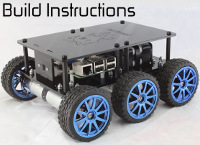Thunderborg failed.
Forums:
Hi,
I received my Thunderborg with Lid last week and installed it into my DiddyBorg robot. It worked fine and we were having great fun with the robot. Yesterday, I removed the batteries, recharged them and replaced them in the robot. There is now no reaction from the ThunderBorg.
The battery pack (10 x 1.2V) is fine, showing 12.8 volts on my AVO meter and I get the same voltage at the PP£ contacts. The switch is on the on position, however, the LED's do not light up and nothing happens. It is as if there is no power available at all. I have the same result connecting the battery to the green terminal block on the ThunderBorg itself.
If I power the Pi through it's own USB port then the Pi boots and the ThunderBorg seems to start up as expected.
I suspect the problem is with the lid.
Do you have any advice on how I should progress to trouble shoot the problem?
Cheers
Paul
- Log in to post comments



piborg
Tue, 06/11/2019 - 10:48
Permalink
Checking the 5V regulator
Given the description I suspect that the 5V regulator on the ThunderBorg might be faulty.
You can check the regulator by carefully testing the voltages circled in the image below when the batteries are connected and the switch is on. If the problem is with the lid then there will not be any power on any of the pins. If the problem is the regulator then the battery voltage pin will be correct, but the 5V pin will not have any power.
vascowhite
Tue, 06/11/2019 - 13:12
Permalink
Voltages checked
Hi,
Thanks for the response. It looks like you are right about the regulator. The battery pin showd 12.5V, but there was nothing on the 5V pin.
Where do we go from here?
Cheers
Paul
piborg
Tue, 06/11/2019 - 14:14
Permalink
Replacement ThunderBorg
I think the best thing to do is exchange the ThunderBorg with Lid for a replacement :)
If you could contact our sales team using our contact form. Select the "Direct contact" category and explain that we have determined the board is faulty. They will get a replacement board shipped out to you.
If you can also send the faulty board back to us at this address:
vascowhite
Tue, 06/11/2019 - 14:37
Permalink
That's Great!
Thank you very much, I'll contact them now.
Thanks for your help.
vascowhite
Wed, 04/22/2020 - 15:33
Permalink
Happened again.
Hi Guys,
Less than a year later and very little use on the Thunderborg, I have the same issue again. I did the tests above on this board with the same result that the regulator seems to have failed.
Can you help?
Cheers
Paul
piborg
Thu, 04/23/2020 - 10:51
Permalink
Possible short circuit?
Is it possible that part of the ThunderBorg or Lid are coming into contact with a metal surface or exposed wiring?
I ask because this is a very rare fault. Either you have been very unlucky, or something is damaging the boards :(
vascowhite
Thu, 04/23/2020 - 14:27
Permalink
Possible Short Circuit
I don't think so, as I keep the original plastic top on the DiddyBorg and only remove it for changing batteries.
I guess I can't rule out the possibility that I have shorted it by accident, although the fault seems to have appeared between uses and without me tinkering.
You replaced the unit last time, I'm very appreciative of that, I don't expect you to do it again, but wondered if it was an inherent fault.
piborg
Sat, 04/25/2020 - 13:05
Permalink
Just unlucky I guess
We had a look yesterday, there is nothing in the board design or fault reports that would suggest a problem with the boards themselves.
Generally it seems to be faulty regulators, most of which fail our testing. It seems like a small number slip through by working initially and failing later :(
Since it is just the regulator it would be possible to use a BattBorg to power the Pi instead. Am I right in thinking that you have an original DiddyBorg that came with a BattBorg?
vascowhite
Sun, 04/26/2020 - 14:38
Permalink
Yes.
Yes, that's correct, I originally used a Battborg for power.
piborg
Tue, 04/28/2020 - 11:13
Permalink
BattBorg can be used as a replacement regulator
You should be able to use that BattBorg to power the Raspberry Pi if it is not being used for something else. It uses the same regulator that the ThunderBorg has.
This can be done by attaching V+ and GND on the BattBorg to the V+ and GND screw terminals on the ThunderBorg. The BattBorg will then need a 3-pin cable to connect it to the spare 6-pin connector on the ThunderBorg.
When connected this way the BattBorg will only have power when the switch is in the on position.
White and red are 5V, black is GND
Can be connected to either #2 (magenta) or #4 (yellow) in the above diagram, whichever is free.
vascowhite
Wed, 04/29/2020 - 15:53
Permalink
Thanks
That looks like an interesting solution, thanks.
I'll give it ago and let you know how I get on.